外研版(2019) 必修 第一册 Unit 2 Exploring English Understanding ideas language points(32张PPT)
文档属性
| 名称 | 外研版(2019) 必修 第一册 Unit 2 Exploring English Understanding ideas language points(32张PPT) | 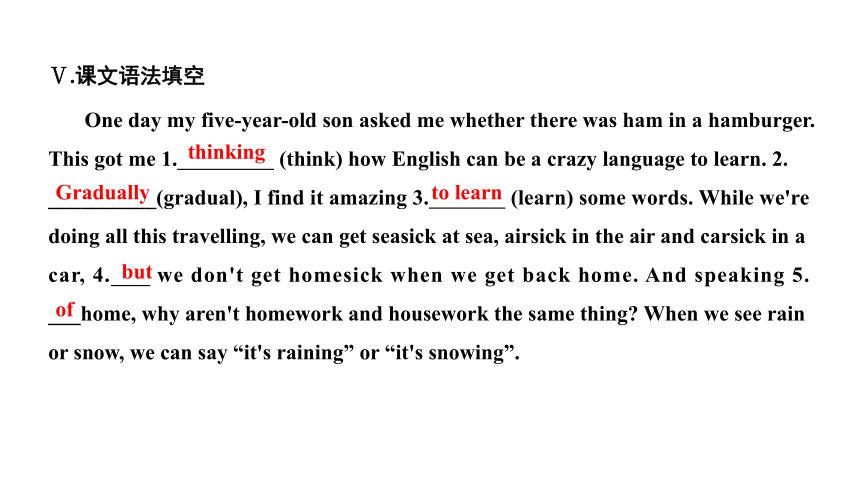 | |
| 格式 | zip | ||
| 文件大小 | 391.9KB | ||
| 资源类型 | 教案 | ||
| 版本资源 | 外研版(2019) | ||
| 科目 | 英语 | ||
| 更新时间 | 2023-02-09 15:51:14 | ||
图片预览

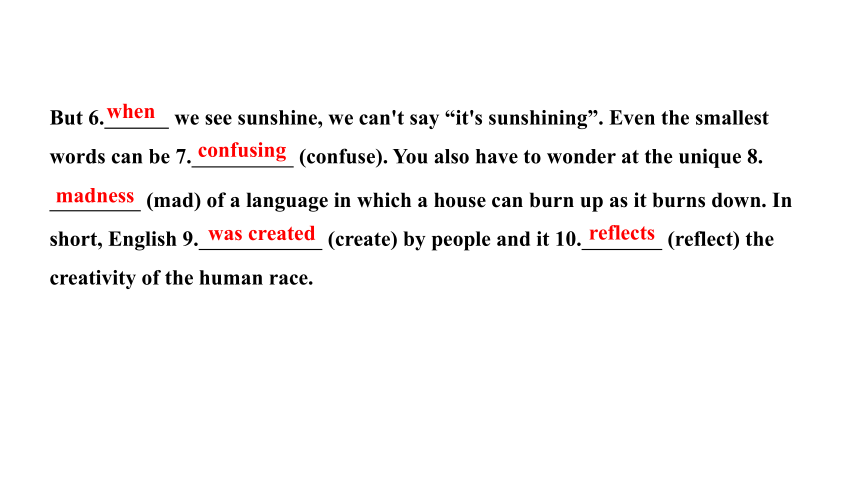
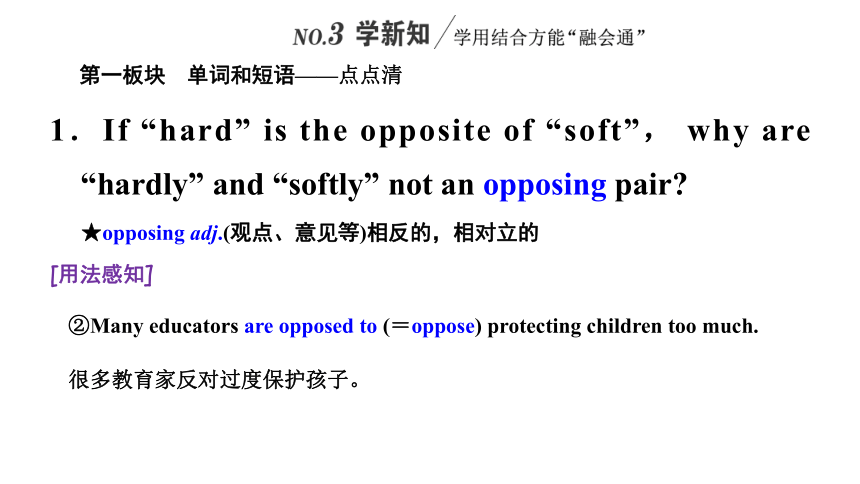
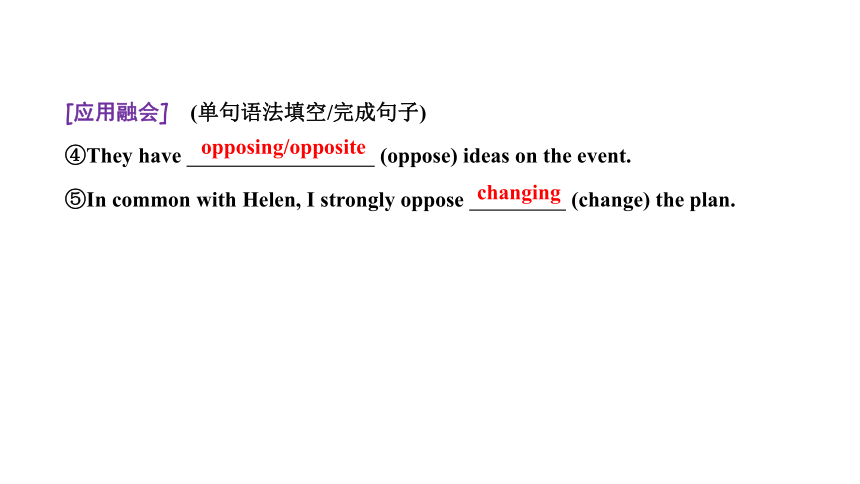
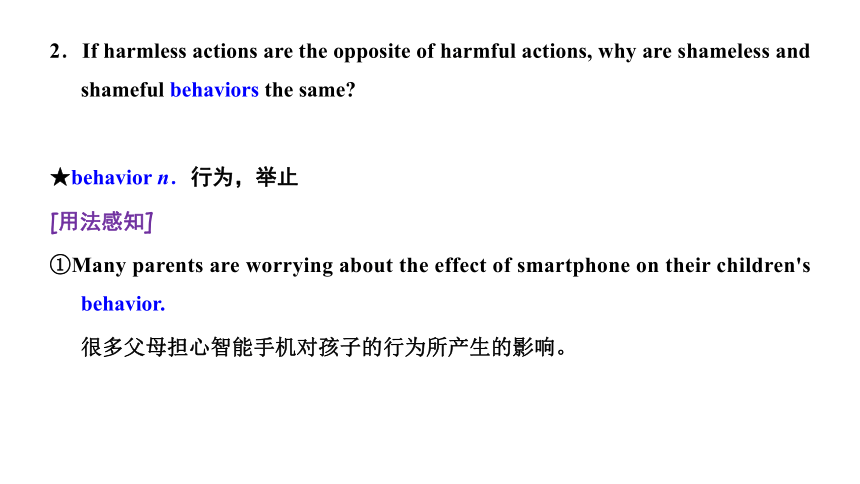
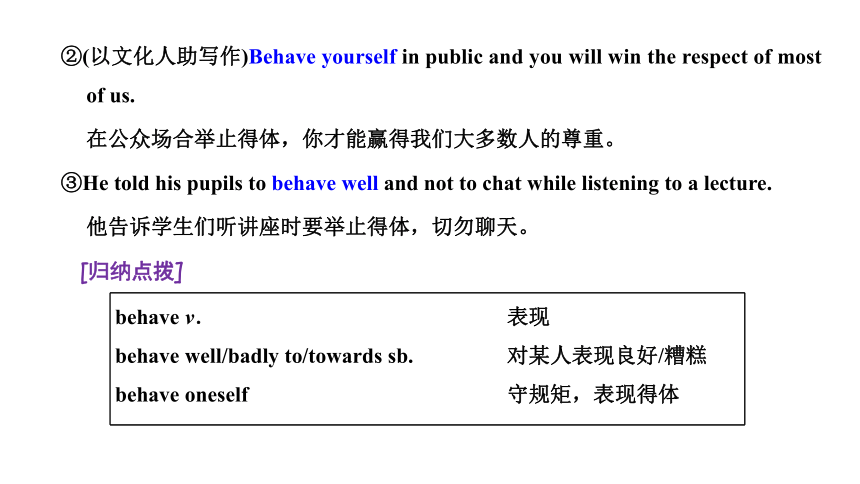
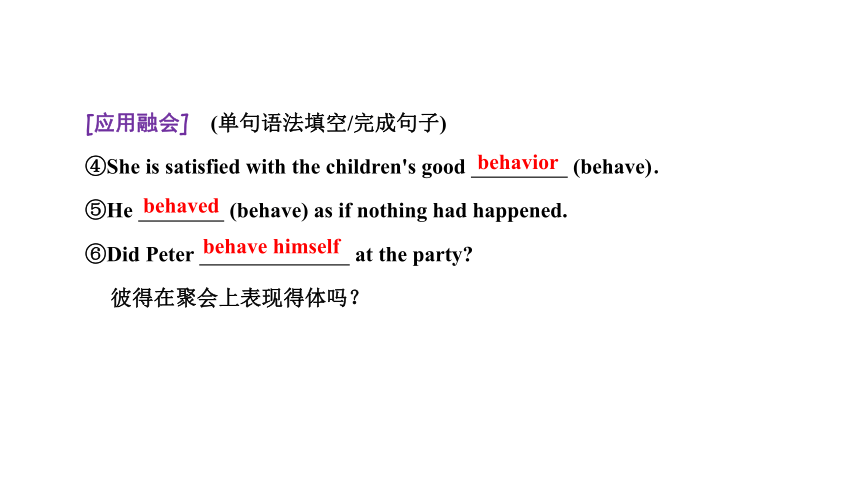
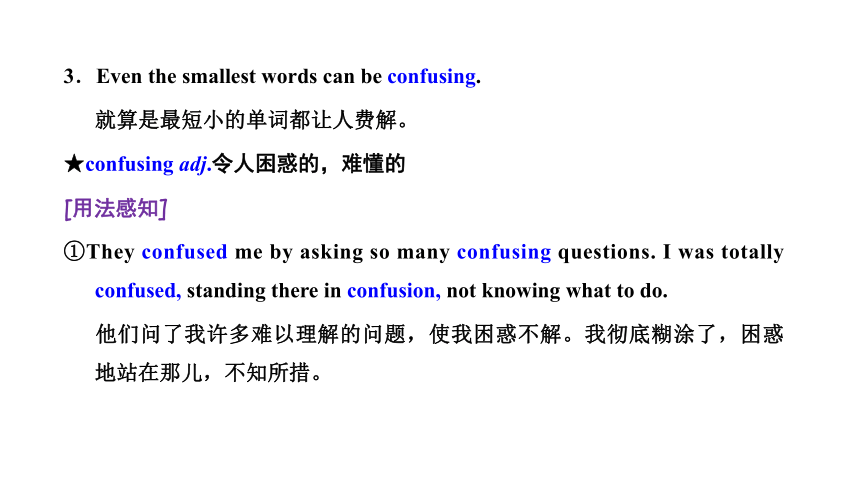
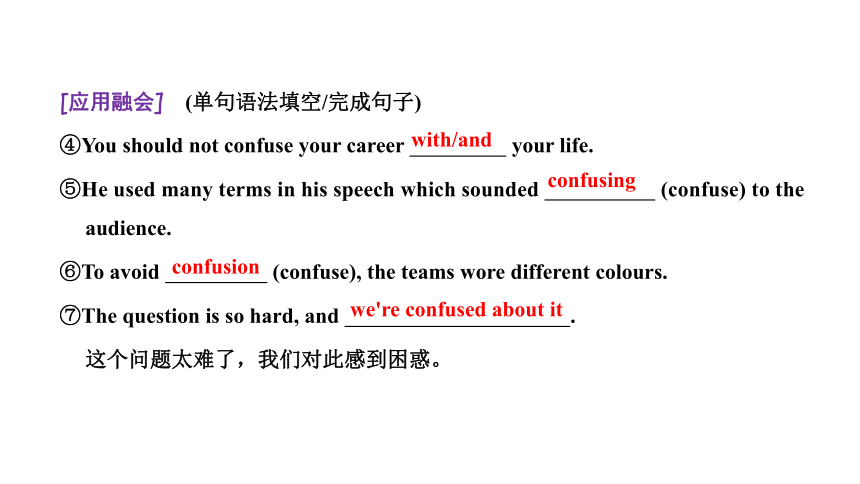
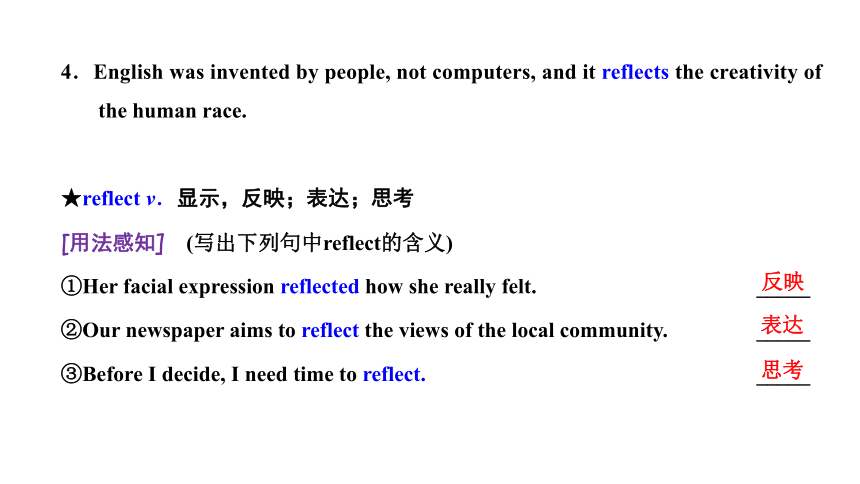
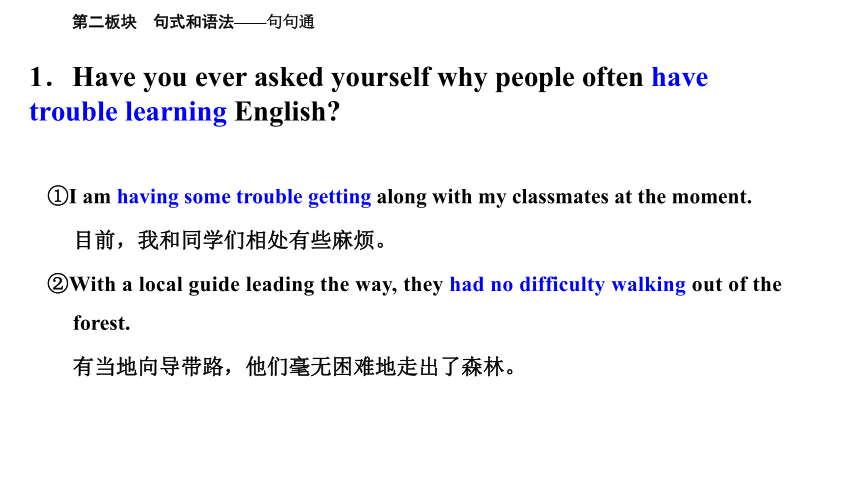
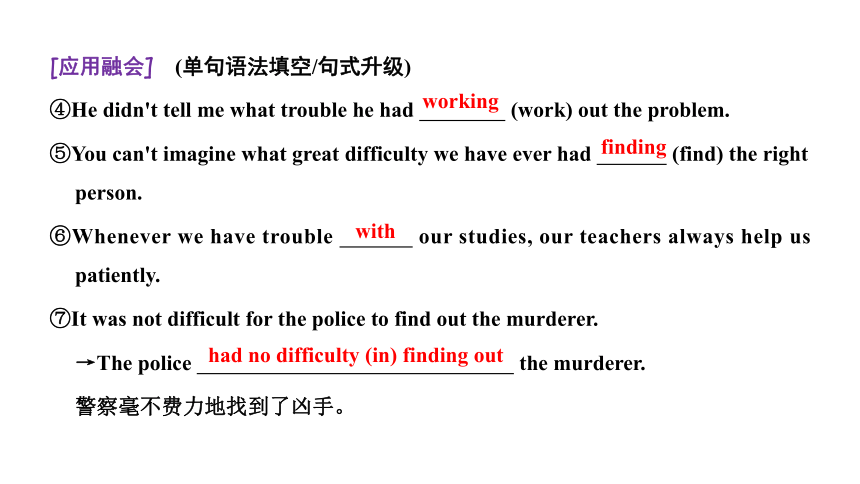
文档简介
(共32张PPT)
Ⅴ.课文语法填空
One day my five-year-old son asked me whether there was ham in a hamburger. This got me 1. (think) how English can be a crazy language to learn. 2. __________(gradual), I find it amazing 3. (learn) some words. While we're doing all this travelling, we can get seasick at sea, airsick in the air and carsick in a car, 4. we don't get homesick when we get back home. And speaking 5. ___home, why aren't homework and housework the same thing When we see rain or snow, we can say “it's raining” or “it's snowing”.
thinking
Gradually
to learn
but
of
But 6. we see sunshine, we can't say “it's sunshining”. Even the smallest words can be 7. (confuse). You also have to wonder at the unique 8.
(mad) of a language in which a house can burn up as it burns down. In short, English 9. (create) by people and it 10. (reflect) the creativity of the human race.
when
confusing
madness
was created
reflects
第一板块 单词和短语——点点清
1.If “hard” is the opposite of “soft”, why are “hardly” and “softly” not an opposing pair
★opposing adj.(观点、意见等)相反的,相对立的
[用法感知]
②Many educators are opposed to (=oppose) protecting children too much.
很多教育家反对过度保护孩子。
[应用融会] (单句语法填空/完成句子)
④They have (oppose) ideas on the event.
⑤In common with Helen, I strongly oppose (change) the plan.
opposing/opposite
changing
2.If harmless actions are the opposite of harmful actions, why are shameless and shameful behaviors the same
★behavior n.行为,举止
[用法感知]
①Many parents are worrying about the effect of smartphone on their children's behavior.
很多父母担心智能手机对孩子的行为所产生的影响。
②(以文化人助写作)Behave yourself in public and you will win the respect of most of us.
在公众场合举止得体,你才能赢得我们大多数人的尊重。
③He told his pupils to behave well and not to chat while listening to a lecture.
他告诉学生们听讲座时要举止得体,切勿聊天。
[归纳点拨]
behave v. 表现
behave well/badly to/towards sb. 对某人表现良好/糟糕
behave oneself 守规矩,表现得体
[应用融会] (单句语法填空/完成句子)
④She is satisfied with the children's good (behave).
⑤He (behave) as if nothing had happened.
⑥Did Peter at the party
彼得在聚会上表现得体吗?
behavior
behaved
behave himself
3.Even the smallest words can be confusing.
就算是最短小的单词都让人费解。
★confusing adj.令人困惑的,难懂的
[用法感知]
①They confused me by asking so many confusing questions. I was totally confused, standing there in confusion, not knowing what to do.
他们问了我许多难以理解的问题,使我困惑不解。我彻底糊涂了,困惑地站在那儿,不知所措。
[应用融会] (单句语法填空/完成句子)
④You should not confuse your career your life.
⑤He used many terms in his speech which sounded (confuse) to the audience.
⑥To avoid (confuse), the teams wore different colours.
⑦The question is so hard, and .
这个问题太难了,我们对此感到困惑。
with/and
confusing
confusion
we're confused about it
4.English was invented by people, not computers, and it reflects the creativity of the human race.
★reflect v.显示,反映;表达;思考
[用法感知] (写出下列句中reflect的含义)
①Her facial expression reflected how she really felt. _____
②Our newspaper aims to reflect the views of the local community. _____
③Before I decide, I need time to reflect. _____
反映
表达
思考
①I am having some trouble getting along with my classmates at the moment.
目前,我和同学们相处有些麻烦。
②With a local guide leading the way, they had no difficulty walking out of the forest.
有当地向导带路,他们毫无困难地走出了森林。
1.Have you ever asked yourself why people often have
trouble learning English
第二板块 句式和语法——句句通
[应用融会] (单句语法填空/句式升级)
④He didn't tell me what trouble he had (work) out the problem.
⑤You can't imagine what great difficulty we have ever had (find) the right person.
⑥Whenever we have trouble our studies, our teachers always help us patiently.
⑦It was not difficult for the police to find out the murderer.
→The police the murderer.
警察毫不费力地找到了凶手。
working
finding
with
had no difficulty (in) finding out
①Neither the students nor the teacher knows anything about it.
学生和老师都不知道这件事。
②Neither was my wife able to persuade my daughter to change her mind nor were my parents.
我妻子和我父母都没能说服我女儿改变主意。
③If you don't go to the movies, neither/nor will I.
如果你不去看电影,我也不去。
2.Neither is there pine nor apple in pineapple.
[应用融会]
(1)单句语法填空/完成句子
④Neither his parents nor he (like) eating meat.
⑤If he doesn't go to the park tomorrow, .
如果明天他不去公园,我也不去。
likes
neither/nor will I
(2)句型转换
⑦The parents were not satisfied with the result and their son wasn't either. (用neither ...nor 进行同义句转换)
→ satisfied with the result.
Neither the parents nor their son was
3.That is why when the stars are out, they are visible, but when the lights are out, they are invisible.
3.That is why when the stars are out, they are visible, but when the lights are out, they are invisible.
①Tom was ill. That was why he was absent from class.
汤姆病了,那就是他没来上课的原因。
用 That was because...表达________________________________________________
(2)一句多译
她很伤心,那是因为她儿子在一次事故中丧生了。
⑧She was very sad. her son was killed in an accident.
⑨Her son was killed in an accident. she was very sad.
⑩The reason her son was killed in an accident.
That was because
That was why
why she was very sad was that
Ⅰ.单词拼写
1.He won a prize for good (行为) at school.
2.Does such a change in attitude (反映) real experiences in daily life
3.A good teacher, like a child in his soul, should have the (创造性), imagination and exploration (探索) ability.
4.Panda, an interesting and charming creature, is (独特的) to China.
behavior
reflect
creativity
unique
5.He set two (闹钟) clocks in case he got up late.
6.He was making a (看得见的) effort to control himself.
7.She hit upon a perfect (题目) for her new novel.
8.No cigarette is completely (无害的), so don't smoke.
alarm
visible
title
harmless
Ⅱ.单句语法填空
1.We can't imagine the trouble they had (practise) their spoken English.
2.The very earliest (sculpture) were made under the influence of Greek art.
3.He won the game twice and that was we held the celebration party.
4. He (alarm) to discover that his car was gone.
5.I like the jobs which are challenging and (create).
practising
sculptures
why
was alarmed
creative
6.He couldn't have gone out to play last night. could his deskmate because of the bad weather.
7. (speak) of his English, he felt proud of himself.
8.A bad mood is a passive (reflect) of outer factors in one's daily life.
9.People are (confuse) about all the different labels on food these days.
10.Two hundred houses were burn in the fire which broke out yesterday.
Neither
Speaking
reflection
confused
down
Ⅲ.选词填空
1.She is such a shy girl that sometimes she communicating with strangers.
2.He's French, so he can speak write Chinese.
3.I like reading and listening to music .
burn up, fill in, have trouble, look out of, wind up, neither ...nor ..., in sb.'s free time,speaking of
has trouble
neither
nor
in my free time
4. the bicycle, some people think it is out of date in many big cities.
5. the window! It's snowing.
6.Most of the woodland has now been .
7.Please this form, giving your name, age and address.
8.The speaker was just when the door was flung open.
Speaking of
Look out of
burnt up
fill in
winding up
Ⅳ.完成句子
1.If you listen carefully, you'll these questions.
如果认真听讲,你回答这些问题就没有困难。
2.My deskmate has never seen the movie directed by the famous director. .
我同桌还没有看过这部由著名导演执导的电影,我也没有。
3.He lost the game and he didn't come to attend the celebration party.
他比赛失败了,这也正是他没来参加庆祝晚宴的原因。
have no trouble answering
Neither have I
that was why
4.My duty was to the subject.
我的责任是使我们四个人研究这个主题。
5. ,he has decided to go to the countryside to visit his grandmother.
诚实地说,他已经决定去乡下看他奶奶。
get the four of us studying
Honestly speaking
“课时跟踪检测”见“课时跟踪检测(一)”
(单击进入电子文档)
二、背重点单词——写对才行
1. n. 题目,标题
2. adj. 独一无二的,独特的
三、背拓展单词——活用才行
1. v.雕刻,雕塑→ n.雕像,雕刻品,雕塑作品
2. adj.(观点、意见等)相反的,相对立的→oppose v.反对;抵制→opposition n.对立,对立的事物;(强烈的)反对,反抗
3. n.举止,行为→behave v.表现
title
unique
sculpt
sculpture
opposing
behavior
4. adj.令人困惑的→confuse v.使……困惑→confused adj. 困惑的→confusion n.困惑
5. n.警报器;闹钟→alarmed adj.警觉的
6. v.显示,反映→reflection n.显示,反映
7. n.创造性,创造力→create v.创造;创建→ adj.创造(性)的,有创造力的
8. adj.看得见的,可见的→invisible adj.(反义词)看不见的
confusing
alarm
reflect
creativity
creative
visible
四、背短语、词块——多积更行
1. 做某事有困难
2. 一种疯狂的语言
3. 在某人的空闲时间
4. 旅游
5. 晕船/晕机/晕车/想家
6. 说到,谈及
7. ……的反面
8. 相反的一对
have trouble (in) doing sth.
a crazy language
in one's free time
do all this traveling
get seasick/airsick/carsick/homesick
speaking of
the opposite of
an opposing pair
9. 有害的行为
10. 向外看
11. 最短小的单词
12. 在一份医学报告里
13. 烧毁,烧尽
14. 烧毁
15. 填表
16. 把……填满
17. 人类的创造力
18. 给(机械)上发条;使(活动、会议等)结束
harmful actions
look out of
the smallest words
in a medical report
burn up
burn down
fill in a form
fill ... out
the creativity of the human race
wind up
Ⅴ.课文语法填空
One day my five-year-old son asked me whether there was ham in a hamburger. This got me 1. (think) how English can be a crazy language to learn. 2. __________(gradual), I find it amazing 3. (learn) some words. While we're doing all this travelling, we can get seasick at sea, airsick in the air and carsick in a car, 4. we don't get homesick when we get back home. And speaking 5. ___home, why aren't homework and housework the same thing When we see rain or snow, we can say “it's raining” or “it's snowing”.
thinking
Gradually
to learn
but
of
But 6. we see sunshine, we can't say “it's sunshining”. Even the smallest words can be 7. (confuse). You also have to wonder at the unique 8.
(mad) of a language in which a house can burn up as it burns down. In short, English 9. (create) by people and it 10. (reflect) the creativity of the human race.
when
confusing
madness
was created
reflects
第一板块 单词和短语——点点清
1.If “hard” is the opposite of “soft”, why are “hardly” and “softly” not an opposing pair
★opposing adj.(观点、意见等)相反的,相对立的
[用法感知]
②Many educators are opposed to (=oppose) protecting children too much.
很多教育家反对过度保护孩子。
[应用融会] (单句语法填空/完成句子)
④They have (oppose) ideas on the event.
⑤In common with Helen, I strongly oppose (change) the plan.
opposing/opposite
changing
2.If harmless actions are the opposite of harmful actions, why are shameless and shameful behaviors the same
★behavior n.行为,举止
[用法感知]
①Many parents are worrying about the effect of smartphone on their children's behavior.
很多父母担心智能手机对孩子的行为所产生的影响。
②(以文化人助写作)Behave yourself in public and you will win the respect of most of us.
在公众场合举止得体,你才能赢得我们大多数人的尊重。
③He told his pupils to behave well and not to chat while listening to a lecture.
他告诉学生们听讲座时要举止得体,切勿聊天。
[归纳点拨]
behave v. 表现
behave well/badly to/towards sb. 对某人表现良好/糟糕
behave oneself 守规矩,表现得体
[应用融会] (单句语法填空/完成句子)
④She is satisfied with the children's good (behave).
⑤He (behave) as if nothing had happened.
⑥Did Peter at the party
彼得在聚会上表现得体吗?
behavior
behaved
behave himself
3.Even the smallest words can be confusing.
就算是最短小的单词都让人费解。
★confusing adj.令人困惑的,难懂的
[用法感知]
①They confused me by asking so many confusing questions. I was totally confused, standing there in confusion, not knowing what to do.
他们问了我许多难以理解的问题,使我困惑不解。我彻底糊涂了,困惑地站在那儿,不知所措。
[应用融会] (单句语法填空/完成句子)
④You should not confuse your career your life.
⑤He used many terms in his speech which sounded (confuse) to the audience.
⑥To avoid (confuse), the teams wore different colours.
⑦The question is so hard, and .
这个问题太难了,我们对此感到困惑。
with/and
confusing
confusion
we're confused about it
4.English was invented by people, not computers, and it reflects the creativity of the human race.
★reflect v.显示,反映;表达;思考
[用法感知] (写出下列句中reflect的含义)
①Her facial expression reflected how she really felt. _____
②Our newspaper aims to reflect the views of the local community. _____
③Before I decide, I need time to reflect. _____
反映
表达
思考
①I am having some trouble getting along with my classmates at the moment.
目前,我和同学们相处有些麻烦。
②With a local guide leading the way, they had no difficulty walking out of the forest.
有当地向导带路,他们毫无困难地走出了森林。
1.Have you ever asked yourself why people often have
trouble learning English
第二板块 句式和语法——句句通
[应用融会] (单句语法填空/句式升级)
④He didn't tell me what trouble he had (work) out the problem.
⑤You can't imagine what great difficulty we have ever had (find) the right person.
⑥Whenever we have trouble our studies, our teachers always help us patiently.
⑦It was not difficult for the police to find out the murderer.
→The police the murderer.
警察毫不费力地找到了凶手。
working
finding
with
had no difficulty (in) finding out
①Neither the students nor the teacher knows anything about it.
学生和老师都不知道这件事。
②Neither was my wife able to persuade my daughter to change her mind nor were my parents.
我妻子和我父母都没能说服我女儿改变主意。
③If you don't go to the movies, neither/nor will I.
如果你不去看电影,我也不去。
2.Neither is there pine nor apple in pineapple.
[应用融会]
(1)单句语法填空/完成句子
④Neither his parents nor he (like) eating meat.
⑤If he doesn't go to the park tomorrow, .
如果明天他不去公园,我也不去。
likes
neither/nor will I
(2)句型转换
⑦The parents were not satisfied with the result and their son wasn't either. (用neither ...nor 进行同义句转换)
→ satisfied with the result.
Neither the parents nor their son was
3.That is why when the stars are out, they are visible, but when the lights are out, they are invisible.
3.That is why when the stars are out, they are visible, but when the lights are out, they are invisible.
①Tom was ill. That was why he was absent from class.
汤姆病了,那就是他没来上课的原因。
用 That was because...表达________________________________________________
(2)一句多译
她很伤心,那是因为她儿子在一次事故中丧生了。
⑧She was very sad. her son was killed in an accident.
⑨Her son was killed in an accident. she was very sad.
⑩The reason her son was killed in an accident.
That was because
That was why
why she was very sad was that
Ⅰ.单词拼写
1.He won a prize for good (行为) at school.
2.Does such a change in attitude (反映) real experiences in daily life
3.A good teacher, like a child in his soul, should have the (创造性), imagination and exploration (探索) ability.
4.Panda, an interesting and charming creature, is (独特的) to China.
behavior
reflect
creativity
unique
5.He set two (闹钟) clocks in case he got up late.
6.He was making a (看得见的) effort to control himself.
7.She hit upon a perfect (题目) for her new novel.
8.No cigarette is completely (无害的), so don't smoke.
alarm
visible
title
harmless
Ⅱ.单句语法填空
1.We can't imagine the trouble they had (practise) their spoken English.
2.The very earliest (sculpture) were made under the influence of Greek art.
3.He won the game twice and that was we held the celebration party.
4. He (alarm) to discover that his car was gone.
5.I like the jobs which are challenging and (create).
practising
sculptures
why
was alarmed
creative
6.He couldn't have gone out to play last night. could his deskmate because of the bad weather.
7. (speak) of his English, he felt proud of himself.
8.A bad mood is a passive (reflect) of outer factors in one's daily life.
9.People are (confuse) about all the different labels on food these days.
10.Two hundred houses were burn in the fire which broke out yesterday.
Neither
Speaking
reflection
confused
down
Ⅲ.选词填空
1.She is such a shy girl that sometimes she communicating with strangers.
2.He's French, so he can speak write Chinese.
3.I like reading and listening to music .
burn up, fill in, have trouble, look out of, wind up, neither ...nor ..., in sb.'s free time,speaking of
has trouble
neither
nor
in my free time
4. the bicycle, some people think it is out of date in many big cities.
5. the window! It's snowing.
6.Most of the woodland has now been .
7.Please this form, giving your name, age and address.
8.The speaker was just when the door was flung open.
Speaking of
Look out of
burnt up
fill in
winding up
Ⅳ.完成句子
1.If you listen carefully, you'll these questions.
如果认真听讲,你回答这些问题就没有困难。
2.My deskmate has never seen the movie directed by the famous director. .
我同桌还没有看过这部由著名导演执导的电影,我也没有。
3.He lost the game and he didn't come to attend the celebration party.
他比赛失败了,这也正是他没来参加庆祝晚宴的原因。
have no trouble answering
Neither have I
that was why
4.My duty was to the subject.
我的责任是使我们四个人研究这个主题。
5. ,he has decided to go to the countryside to visit his grandmother.
诚实地说,他已经决定去乡下看他奶奶。
get the four of us studying
Honestly speaking
“课时跟踪检测”见“课时跟踪检测(一)”
(单击进入电子文档)
二、背重点单词——写对才行
1. n. 题目,标题
2. adj. 独一无二的,独特的
三、背拓展单词——活用才行
1. v.雕刻,雕塑→ n.雕像,雕刻品,雕塑作品
2. adj.(观点、意见等)相反的,相对立的→oppose v.反对;抵制→opposition n.对立,对立的事物;(强烈的)反对,反抗
3. n.举止,行为→behave v.表现
title
unique
sculpt
sculpture
opposing
behavior
4. adj.令人困惑的→confuse v.使……困惑→confused adj. 困惑的→confusion n.困惑
5. n.警报器;闹钟→alarmed adj.警觉的
6. v.显示,反映→reflection n.显示,反映
7. n.创造性,创造力→create v.创造;创建→ adj.创造(性)的,有创造力的
8. adj.看得见的,可见的→invisible adj.(反义词)看不见的
confusing
alarm
reflect
creativity
creative
visible
四、背短语、词块——多积更行
1. 做某事有困难
2. 一种疯狂的语言
3. 在某人的空闲时间
4. 旅游
5. 晕船/晕机/晕车/想家
6. 说到,谈及
7. ……的反面
8. 相反的一对
have trouble (in) doing sth.
a crazy language
in one's free time
do all this traveling
get seasick/airsick/carsick/homesick
speaking of
the opposite of
an opposing pair
9. 有害的行为
10. 向外看
11. 最短小的单词
12. 在一份医学报告里
13. 烧毁,烧尽
14. 烧毁
15. 填表
16. 把……填满
17. 人类的创造力
18. 给(机械)上发条;使(活动、会议等)结束
harmful actions
look out of
the smallest words
in a medical report
burn up
burn down
fill in a form
fill ... out
the creativity of the human race
wind up
